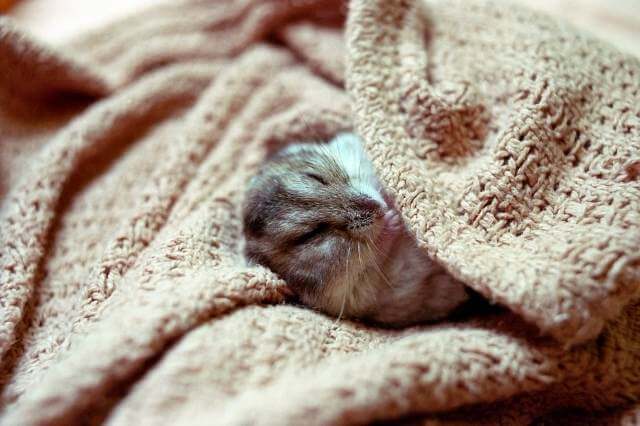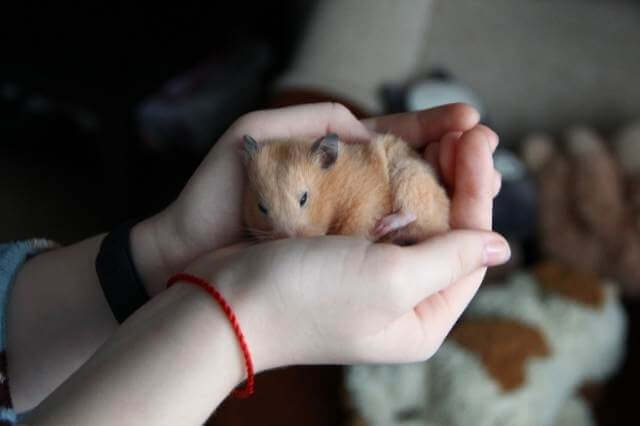Many individuals like keeping hamsters as pets. You might want to know when your hamster will be awake to play when you first buy one.
It’s a widespread misconception that hamsters are nocturnal, however, this isn’t always the case.
Fortunately, we have done our research to determine when your hamster will be awake and ready to play.
Hamsters are active at night or in the early hours of the morning, and dawn and dusk are when they are most active.
Depending on their breed and individual preferences, each hamster will have a distinct preferred wake-up time and sleep routine.
Table of Contents
Why Does My Hamster Wake Up so Late?
Hamsters snooze during the day and throughout the night.
The hamster may believe it is daytime if you leave the cage in a well-lit room in the evening; as a result, he may remain in his nest until it’s dark.
Make it a point to feed him or give him his daily reward at the same time every evening if you want him to wake up earlier in the evening so you can connect with him at a time that fits your schedule.
Regardless of what time you want him to get up, your personal preference might be the determining factor.
He will then become accustomed to the regular feeding hour that has been specified.
He will awaken from his nap once he hears you moving around the cage and becomes aware of your presence.
Keeping the cage in the room’s darkest area while simultaneously turning down the lights or covering it from the room’s strong light can assist.
Hamsters don’t enjoy bright light at any time, so it shouldn’t be too bright either.
After doing this for approximately 3 or 4 nights, he will become used to the routine and wake up and start moving around at the same time every night.

When a Hamster Sleeps a Lot, What Does It Mean?
Generally speaking, if your hamster spends a lot of time sleeping, it signifies that he is a typical little dude that enjoys sleeping all day.
However, excessive sleep should alert you to the possibility that anything is wrong with him.
For instance, you don’t want him to have gone into hibernation.
This often occurs when a cold front has arrived and the cage temperature has dropped too much below optimal.
Your pet goes into hibernation as a result because its wild counterparts need to sleep during the cold months.
This is most likely to occur when the room temperature falls below 50 degrees, however, it can also be brought on by drafts close to the cage.
Make sure your hamster is not placed too close to a fan or air conditioner.
Alternatively, if it’s warm enough and your pet is still sleeping too much, he could have been unwell.
Hamsters frequently get colds and have stomach problems, which might make them want to spend more time in bed.
Keep an eye out for further indications that your child isn’t feeling well, such as sneezing or diarrhea.
Call your veterinarian for more guidance after carefully examining him, and paying attention to his feeding and urinating habits.
To figure out the problem, she could ask you to bring in a sample of feces or she might need to perform tests and blood testing.
Similar to colds in people, your hamster will soon be back to being up all night.
Hamsters Waking up in the Morning—Is This Normal?
Hamsters often stay awake during the day. They may only be active briefly during the day because of their irregular sleeping patterns.
Several breeds have a tendency to be awake more frequently during the day.
Russian Campbell dwarfs, White Winter dwarfs, and Roborovskis are the three breeds mentioned.
Out of all of these breeds, roborovskis are the most likely to be awake throughout the day.
If they become hungry, thirsty, or have to use the restroom throughout the day, they could wake up.
Due to their keen hearing, hamsters are quickly startled by loud noises like a vacuum or music.
Their hamster appears to be awake more during the day than at night, according to several observers.
This may be typical in captivity. Pay attention to your pet’s individual sleeping and waking routine and keep an eye out for any changes.
It’s possible for excessive or insufficient sleep to be an indication of illness in your pet.

Can I Wake Up My Sleeping Hamster?
There are several articles online that describe how to make your hamster adhere to a timetable.
However, it is cruel and may have a negative impact on your pet’s health.
If at all feasible, try to coordinate your interactions with your pet’s natural timetable.
Frequently waking them up might stress them out.
Additionally, if you try to move or handle them when they are fast asleep, they may become startled and bite you.
Nobody enjoys being abruptly awakened from a sound slumber, and since your hamster sleeps for the majority of the day, your daily commotion can unintentionally wake him.
It’s preferable to keep him somewhere in the house where the regular morning traffic won’t wake him up.
Additionally, a startled hamster may attack you if he believes you to be a predator awakening him from his sleep.
Stress can also be brought on by spending too much time awake throughout the day when hamsters should be sleeping soundly.
You don’t want your guy’s regular sleeping hours to be altered if it means he stays up nervously since hamsters get sick when they experience too much tension.
How to Safely Alter the Sleeping Pattern of Your Hamsters
As I hinted at previously, it is safe to alter your hamster’s sleeping schedule, but only by one or two hours.
Any more than that is deemed cruel since it goes against what your hamster is trained to do intuitively.
Since hamsters typically sleep during the day, leaving their cage in a brightly lit area in the evening may cause your pet to mistakenly believe that it is still daylight and remain in bed until it becomes dark outside.
Therefore, the secret is to feed your hamster at the same time every evening if you want to engage with it more and have it fit into your schedule.
At this point, I would give him a treat, perhaps a little apple or blueberry or some vegetables like broccoli or carrots.
You get to choose the time now, but I wouldn’t try to feed your hamster earlier than a couple of hours after his typical wake-up time.
When you start shuffling around in your hamster’s cage, he or she will wake up to hear you and anticipate their yummy snack because they will have become accustomed to this new feeding hour.
The most crucial action here is to maintain your hamster’s cage in the room’s darkest area.
Although you don’t necessarily want it to be completely dark, you also don’t want it to be too light.
In actuality, strong light bothers hamsters both day and night.
Your hamster will get used to this after about 3–4 evenings of doing it consistently, and he or she will start getting up at around the same time each night.

FAQs
Do Hamsters Easily Wake Up?
Your pet hamsters spend their nights sleeping.
Because of this, you frequently catch your pet hamster dozing off during the day when you are awake.
When the sun goes down, they’ll start moving.
Does your pet hamster have any trouble waking up while it is dozing off throughout the day, though?
The sense of hearing is keen in hamsters.
Because of this, your pet hamster might readily awaken if loud noises are made throughout the day.
Additionally, you may simply wake your pet hamster by caressing, patting, or carrying it.
What Causes Hamsters to Wake Up at Night?
Hamsters are awake at night and slept during the day.
But why is it the case? Why do hamsters get up in the middle of the night?
The reason hamsters are awake at night is so they can stay away from predators that may kill and consume them.
Wrapping Up
We’ve looked at a few potential hamster wake-up timings and spoken about the species’ typical sleeping patterns.
We’ve also discussed why it’s not compassionate to alter your hamster’s sleeping schedule.
To assist you to spend more time with your hamster, we’ve also offered some advice on how to move the routine a little bit ahead.
In conclusion, you should try your best to stick to your hamsters’ normal schedule, don’t try to disrupt it, and create an atmosphere that closely resembles their natural habitat.

